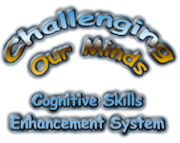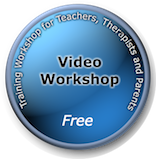
... helping our children become better learners!
Challenging Our Minds (COM) cognitive skills enhancement system began in 1990 as an educational research project designed by Dr. Odie Bracy, a clinical neuropsychologist. This experiment, conducted in a Yorktown, Indiana middle school, was supposed to be just a one semester research project provided through a joint effort of the Yorktown Middle School science teacher and the staff of the Neuroscience Center of Indianapolis. The project was deemed a great success and the program continued there for about 15 years, until the retirement of the teacher.
A research publication that resulted from the Yorktown project [Bracy, O.L., Oakes, A.L., Cooper, R.S., Watkins, D., Watkins, M., Brown, D.E. & Jewell, C. (1999). The effects of cognitive rehabilitation therapy techniques for enhancing the cognitive/intellectual functioning of seventh and eighth grade children. The International Journal of Cognitive Technology, 4(1), 19-27.] demonstrated the effectiveness of computer-assisted cognitive (thinking) skills training for improving the intellectual functioning of 12 to 14 year-old children. Eighty middle school students participated in the 9-week study. The students enrolled in either a computer-assisted thinking skills training group (which utilized computerized exercises modified from brain injury rehabilitation applications) or a study hall control group. A significant increase in intellectual functioning (p<.01) was found only in the experimental group as measured by Jackson's Multidimensional Aptitude Battery.
A second research project included over 250 students over a six year period. In this study the children were assigned to groups in which one group of children showed pre-study IQs less than 100 and the other group showed pre IQs above 100. Two control groups were established using the same criteria. Both experimental groups showed significant increases in IQ as result of participation in the program while their control group counterparts did not. This indicates that neither practice effect nor regression to the mean was responsible for the changes.
A third project was expanded to include students from the third to the eighth grade. The pre- / post- test measures used were also expanded to include: 1) specific areas of cognitive functioning addressed by COM and 2) independent standardized tests of skills and knowledge necessary to advance to the next grade or graduate high school with a diploma. Though they are known by different names from one state to another, most states now utilize these standardized tests.
Statistical analysis of the gain scores (improvement) on the cognitive skills tests showed that the Experimental Group (i.e. those that participated in the COM program) showed significantly more gain than the Control Group on the Non-Verbal subtests (p=.045), nearly so on the Verbal subtests (p=.06) and significantly more gain on the combined subtests (p=.01). In addition, when the Control Group's pre and post scores were compared for improvement, there were no significant gains, while the Experimental Group showed signficant gains from pre to post tests on Non-Verbal (p=.03), Verbal (p=.03) and Combined scores (p=.02).
On the state administered standardized tests (ERB tests), comparison of gains (Control vs Experimental Group), the Experimental Group showed significantly more gain in Reading Comprehension (p=.02). Within groups comparisons showed no significant gains for the Control Group, while the Experimental Group showed significant gains for Mathematics (p=.04) and nearly so for Quantitative Reasoning (p=.09).
Why are these changes important? The changes are evidence that we can improve an individual's brain skills. Our brain skills (such as the attention skills, the executive skills [that allow us to collect and process information], memory, visual and auditory processing, problem solving, communications skills and psychosocial skills) are the skills that help us to learn and acquire new knowledge. Improvement in brain skills can result in better ability to learn, analyze information and make decisions. Challenging Our Minds, when administered properly could help a child to be a better learner. When the learning process becomes easier because the child is better equipped, then the learning process should be less frustrating and much more rewarding for the child. If you are looking for a program to enhance your students' or your own homeschooled child's cognitive/intellectual abilities, please consider Challenging Our Minds.
Copyright 2014 Cognitive Enhancement Systems LLC

